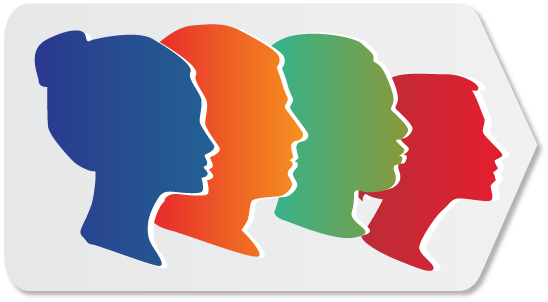
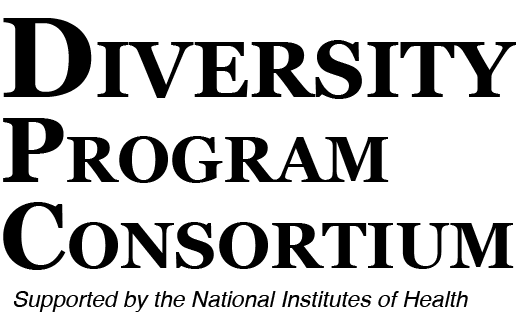



BUILD PODER held the 2015 Fall Conference: Reflections on Privilege on December 2, 2015
Dr. Carrie Saetermoe, BUILD PODER PI and Program Director for BUILD PODER's Research Enrichment Core, organized the conference as an opportunity for the California State University, Northridge (CSUN) community to engage in critical conversations around colorblindness and health inequities. CSUN faculty who work with BUILD PODER undergraduates have been trained by BUILD PODER on topics such as stereotype threat and microaggressions. Tim Wise, nationally renowned public speaker and author of the book “White Like Me: Reflections on Race from a Privileged Son,” was invited to expand these conversations to issues of privilege and colorblindness as a problem in scientific research with his keynote titled Colorblind: The Rise of Post-Racial Politics and the Retreat from Racial Equity.
The conference included an administrative workshop, Privilege Spectrum, White Privilege Room, and keynote. The administrative workshop was led by Wise and was designed specifically for campus leadership to explore the causes of institutional racial inequities. Over 40 administrators were in attendance, including CSUN President Diane Harrison and CSUN Provost Yi Li.
Professors Dimpal Jain, Jose Paez, Sarah Mountz, and CSUN MSW students facilitated the Privilege Spectrum, an activity that explored notions of privilege, oppressions, and resilience.
The White Privilege room was designed to help community members think about historical events and current conditions that make plain the power of White privilege in the U.S.. The exhibit included two primary displays, Peggy McIntosh’s Invisible Backpack (1988) of White Privilege and Jacqueline Battalora’s (2015) treatise on the origins of the “White” race as constructed in U.S. history and its continuation into White economic, social, and other privileges. CSUN student volunteers facilitated discussions throughout the day for conference participants.
Wise’s keynote, Colorblind: The Rise of Post-Racial Politics and the Retreat from Racial Equity, provided an opportunity for faculty, students, staff, and administrators to discuss openly the challenges and benefits of working closely with individuals who are often quite different from ourselves.
Overall, the conference was a huge success with over 600 people in attendance and live-streamed to our 6 pipeline community college partners and the community at large via CSUN’s YouTube channel. While the BUILD PODER 2015 Fall Conference: Reflections on Privilege started a number of important conversations, Dr. Carrie Saetermoe and Dr. Gabriela Chavira, BUILD PODER PI and Program Director for BUILD PODER's Student Training Core, are already working on strategies to keep the momentum created by the conference moving.
View the press release for the event.
Watch the keynote, “Reflections on Privilege with Tim Wise".


BUILD PODER Trainee Jordy Penagos, mentored by BUILD PODER Faculty Mentor Dr. Holli Tonyan, was awarded third place in the Advanced Division of the 29th Biannual Psychology Department Research Competition.
BUILD PODER Scholar Amanda Nuno, mentored by BUILD PODER Faculty Mentor Dr. Cindy Malone, was one of the 23 students honored by the CSU Board of Trustees with the 2015 CSU Trustees’ Award for Outstanding Achievement.
How does the Annual Biomedical Research Conference for Minority Students (ABRCMS) change the world? One student at a time. Or, in the case of California State University Long Beach (CSULB), possibly 40+ students at a time.
This past November, CSULB’s BUILD program brought its first class of Upper Division scholars to ABRCRMS. Comprised of 42 students, it was one of the largest groups ever to attend ABRCMS from a single program. There were high hopes that the experience would broaden these students’ horizons, but the actual results were more than expected.
“They had the time of their lives at ABRCMS,” said Chi-Ah Chun, Ph.D., Director of the Student Training Core for CSULB’s BUILD Program. “Listening to Dr. Hannah Valentine’s keynote address about the BUILD initiative helped them truly realize what a big deal BUILD is, even though they had already heard from us. They really enjoyed networking with other students, faculty, and recruiters.”
One scholar was so moved by Dr. Valentine’s keynote address that she stood up and thanked the National Institutes of Health (NIH) for creating the BUILD program. Rhea-Comfort Addo commented on how BUILD helped her see her own potential as a scientist and gave her the confidence to pursue a research career.
Another scholar posted on Facebook the following note that summarizes what most of the students were feeling, while juxtaposing her conference experience with the horror that unfolded in Paris at the same time. Given that one of the people killed in the terrorist attacks was a fellow CSULB student, what she has to say is especially poignant.
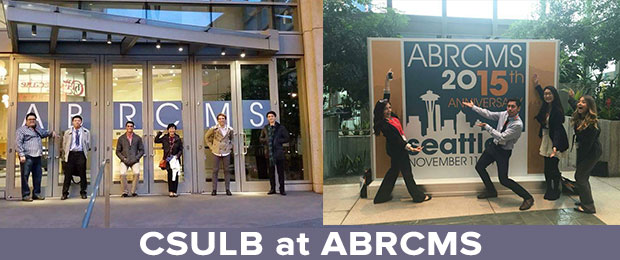
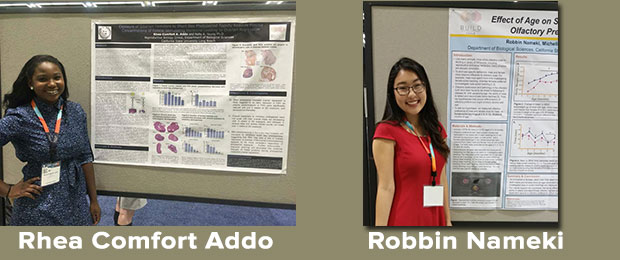
“ABRCMS was a complete success, and more than anything I am so, SO proud of my university and to be a part of it. The science majors here have an intense love for science and are the most hilarious and awesome group of nerds I have ever met. We also have an amazing group of faculty members that managed to receive a 24 MILLION dollar grant from NIH to promote our success in science and other generations to come. They are the reason why we are here [sic] today and growing as scientists. Honestly, I was feeling incredibly sad the other day about how we were here, nonchalantly attending a conference while the tragedy in Paris was unfolding. But then I realized that students from all over the world were attending this conference to develop their careers as future cancer biologists, psychologists, doctors and more. And I am certain that all 3,600 students that attended this conference is going to use this as a stepping stone to save 1000000000x more lives than any damage ISIS can do. This week has given me so much motivation and aspirations. So GO BEACH, thanks for the great week and time to hit the books again!”
- Robbin Nameki
Of the many students who presented at ABRCMS, 11 of them came from CSULB’s BUILD program. With less than six months training, three of that 11 received special recognition for their research and presentations.
CSULB’s BUILD scholars returned to campus inspired and invigorated, filled with a sense of purpose and aware of their role in the larger picture of what BUILD is trying to accomplish. Before ABRCMS, the things they had to do for BUILD were just “more things they had to do.” After ABRCMS, they were giddy and happy to come to the BUILD Learning Community meetings.
At ABRCMS, Desmond Tutu’s daughter, Nontombi Naomi Tutu said “You are the fulfillment of our struggles…be a torch that lights the way of those that will come after.” The conference helped the scholars feel that on a deeper level, leaving them ready to pay it forward as they eagerly mentor the Lower Division BUILD scholars, fueled by a greater sense of purpose.

iBiology produces free online videos about the latest research in the life sciences, as well as the personal stories and opinions of the people that make up the scientific workforce. iBiology’s videos typically feature leading researchers giving seminars or short talks about their science as well as notable words of advice from their experiences as scientific professionals. As part of their partnership with NRMN, iBiology has created a special archive of videos that showcase the achievements of successful scientists from a diverse variety of backgrounds, and present critical insight towards answering the call for building greater diversity across scientific research teams and the NIH-funded research workforce at large.
Part of iBiology’s NRMN video archive is a series of short, culturally-relevant, and culturally-responsive videos it produces exclusively for NRMN on diversity, mentoring, networking and professional development topics that are designed to support NRMN in its effort to advance scientists. The production of these videos entails filming speakers in iBiology’s studios.
iBiology also works with NRMN to produce and host online webinars through Google Hangouts, the first of which, entitled “Mentoring to Diversify the Biomedical Workforce” featuring panelists Dr. Angela Byars-Winston of the University of Wisconsin-Madison; Dr. Kenneth Gibbs, Jr. of the National Cancer Institute; Dr. Joel Oppenheim of New York University; and Dr. Sonia Zárate of the University of San Diego, took place on October 5th and can now be viewed within the video archive.
NRMN invites you to browse this rich and growing library of videos.
Are there topics you would like to suggest that would be of interest to your program participants? Send your suggestions.
As NRMN continues to expand this video library, NRMN staff are collecting feedback from partners and personnel to determine the topics that are most relevant to each career stage of biomedical student or researcher, and use this feedback to inform the selected topics of new videos produced by iBiology and added to the NRMN iBiology video archive. In November and December, NRMN's Professional Development Core engaged 35 Consortium members from across NRMN (14), the NRMN subawards (8), the BUILDs (11), and the CEC (2) to vote on proposed video topics, asking which were the most relevant for each of the following groups: undergraduates, graduates, postdocs, and early stage faculty. The following topics were voted to be the most important for each respective group and will inform the continued expansion of the iBiology-NRMN video archive:
Undergraduates: Preparing for the transition into graduate school
Graduates: Exploring research career options
Postdocs: Building your own research program/team
Early Stage Faculty: Building your own research program/team
In addition to being a partner of NRMN, iBiology is funded by the National Science Foundation, the National Institute of General Medical Sciences, and the Howard Hughes Medical Institute and supported by the American Society for Cell Biology.
One of the National Research Mentoring Network's Supplement Awards is the NRMN - Committee on Institutional Cooperation Academic Network (NRMN-CAN) initiative. NRMN-CAN held its inaugural Professional Development and Grantwriting Conference November 1-3, 2015, at the Big Ten Conference Center in Rosemont, IL, with much success. This event brought together more than 50 postdoctoral trainees and early career junior faculty members with 40 experienced faculty members and administrators from across the CIC network, which is comprised of the Big Ten Universities, now including University of Maryland College Park, Rutgers, Penn State, and Purdue Universities, along with the University of Chicago and University of Illinois at Chicago. The NRMN-CAN program addresses the need for greater diversity in the biomedical sciences' academic research workforce across the country and is designed to advance the academic career paths of all researchers across the biomedical sciences, including those from populations that are currently underrepresented in the NIH-funded workforce.
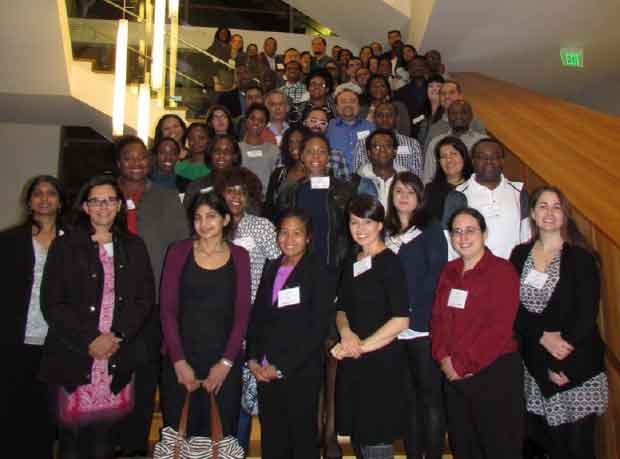
The NRMN-CAN kick-off conference, Passport to Success, featured professional development and grantsmanship skill building. The postdoctoral and junior faculty trainees gathered on Sunday evening, November 1st, for a networking reception followed by an opening interactive workshop, "Your Science Identity", led by Dr. Mary Nucci and Dr. Xenia Morin, both of Rutgers University. In this session, the trainees learned about the demographics of the science community, the value of diversity in science, and how to develop confidence in their personal sense of scientific identity in research, teaching, education and mentoring.
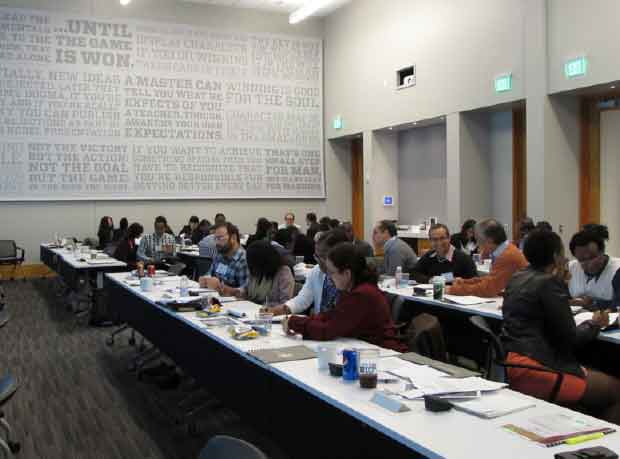
On Monday, November 2nd, the trainees participated in a full day of professional skill development workshops, focused on academic research career preparation. Dr. Philip Clifford of the University of Illinois at Chicago started the day off with "Navigating a Successful Academic Career", an interactive workshop in which the trainees began to create their individual development plans (IDP) and set specific goals for moving their careers ahead. The next workshop, "Tools for Success: What and how to prepare for the academic job search process" was led by Dr. Peter Hitchcock from the University of Michigan. This session covered the details of the academic job search: application materials, the interview process, and negotiation considerations.
Following lunch, Dr. E. Albert Reece, Vice President for Medical Affairs and Dean of the School of Medicine at the University of Maryland, delivered the Keynote Address, "Steps to a Successful Career in Academic Medicine." His inspiring talk described his distinguished career and touched on the career development of several trainees whom he has mentored. Dr. Reece encouraged the trainees in attendance to seek out multiple mentors in the workplace who will provide them with the boost they need to successfully launch their careers in academic research.
In the afternoon, two workshops built upon the themes that were introduced in the morning workshops and by Dr. Reece. Joanne Lipo Zovic, of the University of Wisconsin-Milwaukee and Marquette University Law School, led a Negotiation Skills Workshop in which she introduced the basics of effective negotiation and led interactive exercises for the trainees.
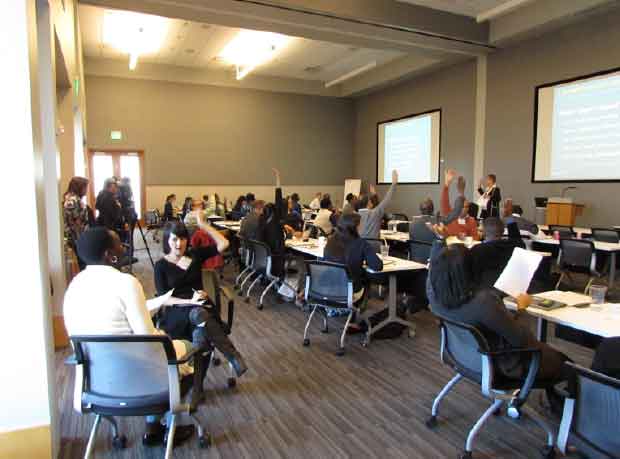
The final workshop, "'Mentoring Up': NRMN-CAN Conference Re-Cap November 1-3, 2015 Maximizing Your Relationship with Your Mentor(s)" was led by Dr. Christine Pfund from the University of Wisconsin-Madison, Principal Investigator of the NRMN Mentor Training Core. In this session, the mentor-mentee relationship was examined and strategies were shared for getting the most out of this relationship in order to achieve research and professional goals.
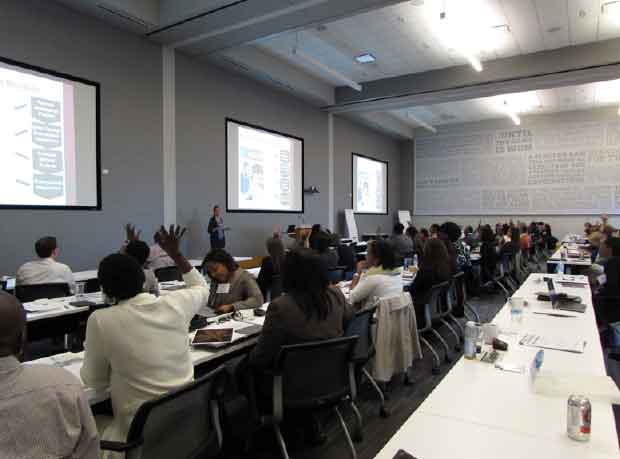
While the trainees were engaged in the afternoon workshops, 20 experienced faculty grantsmanship coaches from the CIC universities had also arrived at the Big Ten Center. Dr. Rick McGee of Northwestern University led the "NIH Grant Writing Group Coaches Training" workshop, in which these faculty members learned about the NRMN group-based grant writing coaching design.
On Tuesday, all of the trainees and faculty coaches came together. First, Dr. McGee led the session, "A Novel Coaching-Group Approach to Developing Grant Writing Skills: In the Trenches Doing It!" which detailed how to tailor a grant application for grant reviewers. Faculty grantsmanship coaches and trainees then broke out into teams to start revising the grant applications that the trainees had drafted, using the NRMN approach they had just learned. The groups will continue to meet on their home campuses over the next few months, until the trainees have submitted their final grant applications.
During the wrap-up session of the conference, "Passport to Success", led by Conference Program co-Chair Dr. Xenia Morin, trainees reflected on their conference experience and wrote down their take-home messages as well as their next steps and action items. This left the trainees with a sense of purpose and a clear action plan going forward. Feedback about the conference has been extremely positive thus far, and the trainees were very appreciative that this program had been organized and that they were able to participate.
This conference was the effort of many people including the NRMN-CAN PIs, Dr. Nancy Schwartz and Ms. Amber Cox, the Conference Program co-Chairs, Ms. Pallavi Eswara and Dr. Xenia Morin, NRMN-CAN Program Coordinator, Dr. Laurie Risner, and NRMN-CAN Committee members from all of the participating CIC institutions, as well as the guest speakers. The NRMN-CAN group is currently planning their next event: a Facilitating Mentor Training Workshop to be held in March, 2016.
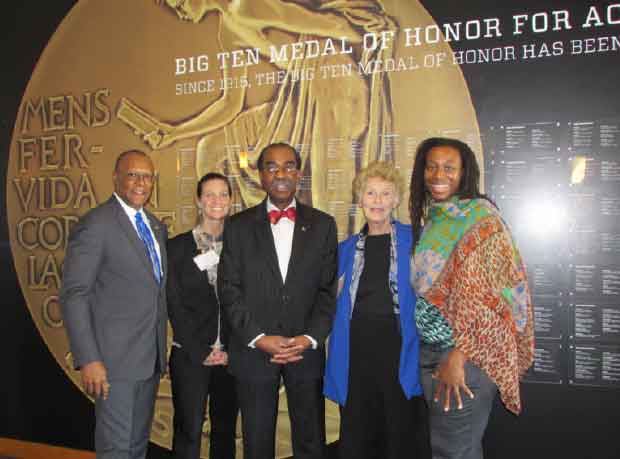
In 2015, NRMN staff appeared at several conferences and scientific meetings around the country, raising awareness of its programs with scientists from a diverse array of backgrounds and scientific disciplines.
The Society for Advancement of Chicanos and Native Americans in Science (SACNAS) is one of NRMN's foremost partners. As the National Hispanic Heritage Month (September 15th to October 15th) passed and National Native American Month began, NRMN joined over 4,000 students, scientists, educators, and professionals at SACNAS 2015 to participate in the annual meeting, which highlights the accomplishments of student researchers at all career stages and focuses on the importance of mentoring.
NRMN staff from Wisconsin, Texas, and Massachusetts built awareness of NRMN through a series of talks and presentations throughout the agenda. At the NRMN conference hall booth, NRMN representatives provided more information about NRMN and navigated attendees to register their profile on the NRMNet.net website, where users can access NRMN's virtual mentoring program and discover opportunities to participate in other NRMN programming.Among the invited conference speakers was NRMN's Lead PI, Dr. David Burgess, who presented a stage talk about his personal story as a scientist who happens to be Cherokee, and the importance to his career of his membership in, and leadership as, former president of SACNAS.Watch the video of Dr. Burgess's talk.In November, a group of NRMN staff attended the 2015 Annual Biomedical Research Conference for Minority Students (ABRCMS), which took place from the 11th through the 14th at the Washington State Convention Center in Seattle.
NRMN appeared throughout the conference agenda, with faculty such as Dr. Jamboor Vishwanatha (Principal Investigator of NRMN's Mentorship and Networking Core) and Dr. Harlan Jones (program director of the NRMN Professional Development Core's NRMN-STAR grantwriting coaching program) giving formal presentations about the new and exciting mentorship initiatives offered through NRMN.Staff from the NRMN Mentorship and Networking Core (at University of North Texas Health Science Center), Professional Development Core (at University of Minnesota) and Administrative Core (Boston College) also represented NRMN throughout the event's conference hall hours from November 12th through the 14th, where they had an official presence at the booth of the National Institute of General Medical Sciences (NRMN's grant-awarding Institute of the NIH) and were able to interact with students during scientific poster presentation sessions.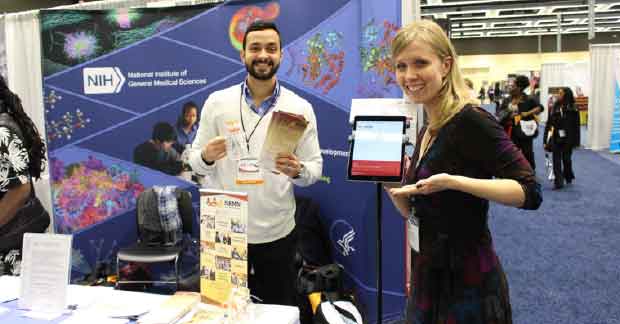
NRMN representatives spoke with the 3,600+ conference attendees, registering new users on NRMNet.net at the NIGMS booth and building awareness of NRMN programming.
The conference agenda featured presentations by the National Institutes of Health, including a talk by NIH's Chief Officer for Scientific Workforce Diversity Hannah Valantine, M.D. where she invited attendees to get involved with NRMN and join the national movement to foster diversity within the U.S. health science workforce.Evening activities during the conference included a meeting on November 12th where NRMN and supporting staff from the National Institutes of Health facilitated group discussions among 58 Scholars from ASCEND (at Morgan State University), BUILD at Xavier (at Xavier University at Louisiana), and CSULB BUILD (at California State University Long Beach), three of ten participating university programs within the NIH Diversity Program Consortium's BUILD program, which promotes inclusion through mentorship programming for undergraduate students in STEM fields. The group broke out into seated circles and participated in activities ranging from "icebreakers" where students introduced themselves and their interests, to a sharing of aspirational statements where students discussed their dreams for the future, from founding a hospital to analyzing the intersection of medicine and religion to advancing nanotechnology within the biomedical sciences.The attending BUILD Scholars expressed excitement over the opportunity to attend ABRCMS as part of the BUILD program, and discussed the possibility of arranging such group sharing meetings formally at future scientific conferences.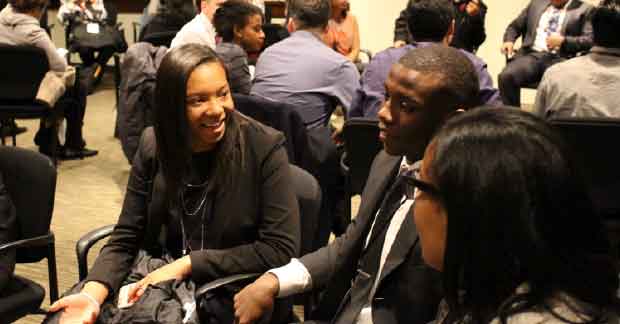
The American Indian Science and Engineering Society saw a record attendance of over 1,800 participants this past November. Staff from the NRMN Mentorship and Networking Core attended the event in Phoenix, AZ and built awareness through the NRMN conference booth.
Staff from the NRMN Administrative Core, including Lead PI Dr. David Burgess, attended the annual American Society for Cell Biology meeting in San Diego this past December 2015. Dr. Burgess presented at various forums throughout, such as the Minority Affairs Committee Meeting, the Women in Cell Biology Committee Meeting, and the Symposium on Mentoring. 42 new contacts were captured who look forward to becoming recipients of the NRMN monthly newsletter.
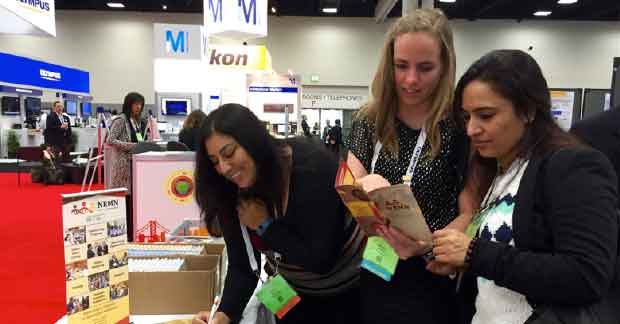
As its name suggests, a critical aspect of the National Research Mentoring Network is its activation of a nationwide network of researchers and professionals supporting the biomedical, behavioral, clinical, and social sciences to come together in forging a new landscape that is inclusive and poised to foster success for scientists throughout the population of the United States. In order to effectively do so, NRMN relies on the commitment of partner organizations whose members represent many of the scientists that NRMN seeks to engage and support.
Organizations that have pledged a commitment to support NRMN include NIH-funded centers, health disparities centers that have offered letters of support, and importantly professional and scientific societies representing tens of thousands of researchers across a wide range of scientific disciplines within the biomedical sciences.
With their robust existing memberships and established communication channels, NRMN's scientific society partners provide support in a number of ways ranging from recruitment of society members as participants in NRMN programming, to sponsorship of in-person NRMN activities on society campuses and at annual scientific meetings.
On October 5th, representatives from over 40 professional and scientific societies were invited to convene with NRMN in Bethesda, MD for a meeting to discuss the growing network of NRMN supporting societies, and review the concrete next steps towards spreading the word about NRMN's programs.
Throughout the morning and in the afternoon, participants engaged in lively discussion about opportunities to leverage this nationwide network and come together on novel initiatives.
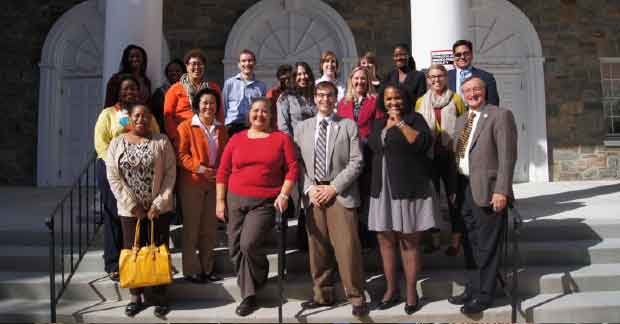
The morning began with an introduction from Dr. David Burgess, NRMN Lead PI, reviewing the story of NRMN's inception, but going deeper to highlight the important role of the many professional and scientific societies, clinical research centers, and NIH funded entities that represent a nationwide network of supporting "NRMN Partners" in the mission of the diversification of the biomedical sciences research workforce. Following this, NRMN's Assistant Director of Communications Drew Simenson reviewed some detailed tactics that supporting partners can engage in.
At 1PM Eastern, participants tuned in to a live web broadcast of an expert panel discussion exploring "The Importance of Culturally Responsive Mentoring," co-hosted by iBiology and NRMN. If you were not able to attend and view this Google Hangout. View the recording and access links to relevant publications.
The day's meeting was decidedly productive, and participants concluded with a commitment to meet twice annually, with the next meeting to happen in April of 2016.
Following the meeting, partner representatives in attendance have obtained printed NRMN marketing materials to disseminate among their networks, and, in early in December 2015, partners began including mention of NRMN in newsletters and through targeted email, inviting participants to register their profile on NRMNet.net. Members have also begun adding links to NRMN on their respective websites.
As a result of talks with these partner organizations, NRMN is also planning several programming and presentation engagements in collaboration with societies in 2016. These include a Mentor Training Workshop at the FASEB-sponsored Experimental Biology Meeting happening in San Diego in April and an exhibition at the Society of Developmental Biology's Annual Meeting in Boston in August.
NRMN continues to add new partner societies to its growing network, the latest of which include the American Society for Biochemistry and Molecular Biology (who attended the Oct. 5th meeting at FASEB) and the Biophysical Society (who connected with NRMN members at SACNAS 2015).
Dean celebrates transformation of iNSPIRE Lab
Goals of the Summer Enrichment Program
Get to know the scholars: Carrington Goldsmith from Marygrove College
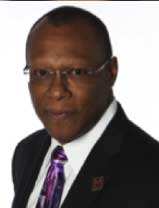
Dr. Stephen B. Thomas, PhD is a professor in the department of Health Services Administration in the School of Public Health and director of the Maryland Center for Health Equity at the University of Maryland, College Park. An internationally recognized leader in research on the elimination of racial and ethnic health disparities to achieve health equity, he is Joint Principal Investigator with Dr. Sandra C. Quinn, of the NIH-NIMHD Center for Excellence on Race, Ethnicity and Health Disparities Research. His community engaged research focuses on how to address both lifestyle and the social determinants that fuel preventable chronic diseases such as cardiovascular disease, cancer, HIV/AIDS, oral health disparities and other conditions concentrated among racial and ethnic minority populations. Additionally, he was Joint Principal Investigator, with Dr. Sandra C. Quinn, on the NIH funded National Bioethnic Research Infrastructure Initiative, "Building Trust between Minorities and Researchers." In 2014, Governor Martin O'Malley appointed Dr. Thomas to the Maryland Commission of Health Care, an independent organization responsible for review and approval of Certificates of Need.
Dr. Thomas has been a pioneer in creating innovative mentoring programs designed for advancing the careers of underrepresented populations in the biomedical workforce. He has served as site director for the Kellogg Health Scholars Program and has launched the Health Equity Leadership Institute in partnership with the University of Wisconsin and the Advancing Faculty Diversity Program at the University of Maryland in College Park.
Dr. Thomas brings his expertise in his new role as Associate Director of the Mentor Training Core of the National Research Mentoring Network. According to Dr. Thomas,
…When it comes to training underrepresented minority scholars, too many well-intentioned senior faculty fall into the role of “tormentors,” rather than effective mentors. Most senior faculty receive little if any formal training on the needs of underrepresented minority scholars. Therefore, research mentors are seldom equipped to assume mentoring roles for underrepresented minority scholars, leaving them especially at risk for inadequate mentoring support.
The National Research Mentoring Network’s approach accelerates beyond this status quo to proactively train mentors who can foster culturally "confident" mentoring relationships with underrepresented minority scholars, enhancing their recruitment, advancement and persistence among the ranks of tenured faculty and across the biomedical workforce.
Dr. Richard McGee, PhD is Associate Dean for Faculty Recruitment and Professional Development, Professor of Medical Education at the Northwestern University (NU), Feinberg School of Medicine. His work is focused predominantly on developing new models and methods for assisting the professional development of young scientists, particularly individuals from underrepresented populations, those from educationally disadvantaged backgrounds and women. He leads a team of social and natural scientists conducting empirical research on the development of young scientists as well as testing group mentoring/coaching and other training methods to augment what mentors ideally teach trainees but too often don’t have time to provide. He directs Grant Writers Coaching Groups, one of the NRMN grant writing workshops in the Midwestern Hub.
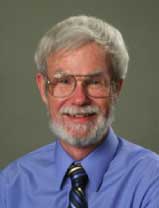
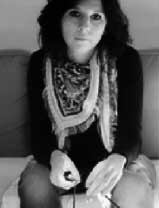
Dr. Anne-Lise Ducluzeau, Ph.D. specialized in the evolution of microorganisms and the origin of life as a student in Marseille, France. Today as a BLaST post-doc, she continues this research in Alaska investigating microbes in the Arctic Ocean and sea ice.
In 2015, Dr. Erich Jarvis, Ph.D. a Neurobiologist currently at Duke University, received the American Society for Cell Biology’s Ernest Everett Just Award in recognition of his outstanding scientific achievements as a minority scientist. “‘I began to appreciate how much of a profound impact ethnicity, culture, and gender can have on an individual’s career. Before then, I was surrounded by persons of diverse backgrounds, many of whom looked like me. However, now I was at a mostly Caucasian institution, clearly one of the world’s best in biomedical science, faced with culture shock of wondering why did most of the students have a shared experience different from me? Although they had their struggles, why were mine different and, in many cases, tougher?’”
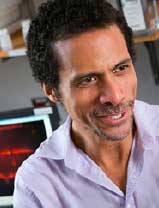
Communication Working Group (Comm WG)
The Comm WG resumed the Webinar Series for 2016. Each session in the series will be held the first Friday of every month at 10am PST/1pm EST effective January 8th. Details are available on the Intranet's calendar. The Comm WG invites everyone to submit proposals for topics of discussion for the webinar series to their site's Comm WG representative. The CEC Communications committee continues to work with each site on content contributions for each edition of the Newsletter. In addition, this committee is updating a draft document that presents a Consortium Wide Communications Strategy.
CEC/Site CWEP Implementation Teams
The CEC has reorganized operations to facilitate the communications and streamline activities associated with the coordination of the Consortium Wide Evaluation Plan (CWEP). Each site is now part of a CEC home team composed of data and evaluation investigators and, supported by administrative specialists and lead by senior CEC Investigators. The idea of creating these teams was made at the Annual Meeting, and it was discussed further during online meetings in December 2015. Each of these teams will meet monthly effective January 19th, 2016. Each site has been contacted individually by email with confirmation on their team membership and their meeting schedule. The CEC and Site teams now have standing monthly meetings on the calendar for 2016, and we look forward to continuing our highly productive collaborations on the CWEP.
Implementation Working Group (Implementation WG)
The CWEP Implementation Working Group, a result of Annual Meeting conversations and redesign, had its inaugural meeting on January 11th, 2016. The Implementation WG will meet monthly and invites particularly the evaluators and data specialists from each of the sites to join the calls. With the roll out of data collection once the OMB application is approved, it will become very important that each site invites those who will be involved with the data collection, management, and analysis to attend these monthly meetings.
Policies and Agreements
The CEC continues working diligently with the Executive Steering Committee (ESC) and the Presentations and Publications Subcommittee (P&P) to finalize the Data Sharing Agreement and revise the draft P&P policy. The ESC met in December to discuss areas of clarification with the latest draft of the DSA and is expecting to have the ESC vote on it for approval no later than the first week of February. Meanwhile the P&P subcommittee continues refining the P&P policy and the P&P structure.
Last month the NIH released its new 5-year strategic plan. Enhancing workforce diversity is one of its goals, and the Diversity Consortium is a highly visible part of that (in fact, it is the only example provided … i.e. all eyes are on us!). See p. 34-35 where it says:
“Under the leadership of its first Chief Officer for Scientific Workforce Diversity, NIH will work to implement the recommendations of the Advisory Committee to the Director’s Working Group on Diversity in the Biomedical Research Workforce. This comprehensive strategy aims to enhance scientific workforce diversity, engaging partners from academia and industry to achieve diversity at all stages of biomedical research career trajectory…Examples of new NIH programs that are part of this strategy are the BUilding Infrastructure Leading to Diversity (BUILD) initiative, which has the long-term goal of catalyzing cultural changes at academic institutions so that talented students from groups historically underrepresented in biomedical research are well-prepared to enter research careers, and the NIH National Research Mentoring Network (NRMN), which will facilitate the development of robust mentoring relationships by pairing scientific leaders with early career scientists from underrepresented groups across the nation. A unique attribute of these programs is that they are being run as a “trial” with a data-coordinating center, collecting common measures across all programs. In this manner, NIH will be able to identify subsets of “best practices” and then swiftly apply them across the network. These best practices will also be used to inform enhancement of other programs that are designed to enhance diversity of the biomedical research workforce.”NIH-Wide Strategic Plan
U.S. News & World Reports indicates that The National STEM Collaborative plans to boost diversity in science, technology, engineering and math at colleges and universities.
Universities Collaborate to Attract Females, Other Minorities to STEM
The Peninsula Clarion, the daily newspaper of Alaska's Kenai Peninsula, reports on an after school program sponsored and organized through the Modern Blanket Toss program. The after school program aims to prepare and inspire prospective first-generation college students to enter STEM fields through the learning process of operating UAVs or drones.
Flight preparations: Drone program exposes students to STEM field
Researchers at the University of California, San Francisco publish findings that despite Federal efforts, clinical studies still miss nearly forty percent of the U.S. population.
Diversity in Medical Research Is a Long Way Off, Study Shows
Nanowerk News reports that Northwestern faculty members have received a $496,000 grant from the National Science Foundation to establish "The Nanomedicine Academy of Minority Serving Institutions".
Launching the Nanomedicine Academy of Minority Serving Institutions
The Journal of Blacks in Higher Education reports that four of the 32 scholarships offered by The Marshall Aid Commemoration Commission were awarded to African Americans.
Four African Americans Win Marshall Scholarships
The GW School of Engineering and Applied Science showcases four inspiring woman that are shaping the future of the STEM workforce.
4 inspiring women shaping the future of the STEM workforce
Anne Claire Vollers, writing for Al.com (a website about all things Alabama), showcases Dr. Hadiyah-Nicole Green. Dr. Green is an Alabama scientist, one of the nation's few black female physicists.
Alabama scientist, one of nation's few black female physicists, breaks ground in cancer research
Nature reports a decline in the availability of US biomedical postdocs.
Massive pool of US biomedical postdocs starts to shrink
The New York Times reports on racial discrimination protests at multiple U.S. Colleges.
Racial Discrimination Protests Ignite at Colleges Across the U.S.
U.S. News & World Report reports on complaints of casual, everyday racism.
In the wake of Missouri uproar, black students around US complain of casual, everyday racism
The NIH Diversity Program Consortium (DPC) Newsletter is intended to provide updates and announcements from DPC team members, highlight news related to diversity and professionals from underrepresented backgrounds in biomedical science, share progress on the collaborative efforts within the Coordination & Evaluation Center at UCLA (CEC) to inform Working Group's achievements, and ultimately serve as the main avenue to DPC-wide communications.
Copyright 2016. All Rights Reserved